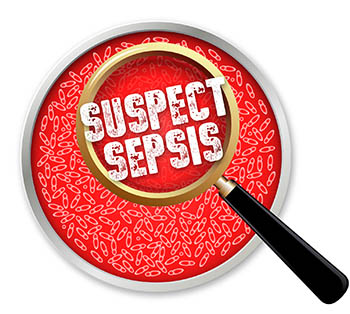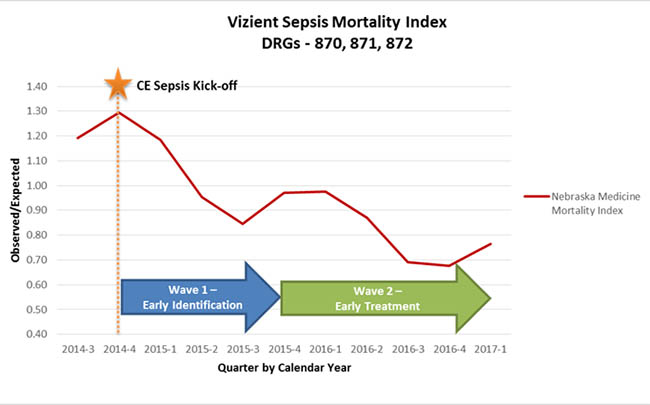The latest data reveals more Nebraska Medicine patients are surviving sepsis. Those gains are due, in part, to a pilot program that ran from Nov. 1, 2016 to Jan. 31, 2017 on 5 West and 8 Telemetry. The pilot created a “Code Sepsis Team,” comprised of a hospitalist advanced practice provider, a lead Intensive Care Unit nurse and a critical care pharmacist.
 |
Since sepsis is an emergency, the team responded immediately to the bedside and assessed the patient for sepsis criteria. They worked with the primary team to order initial and repeat lactates, blood cultures, appropriate antibiotics and 30ml/kg of intravenous fluids — following the recommended three- and six-hour treatment bundles defined by the Surviving Sepsis guidelines.
The largest benefit of the team was improved adherence to the treatment bundles, resulting in better outcomes and increased compliance with the Centers for Medicare and Medicaid (CMS) sepsis core measure. Sixty percent of patients evaluated and treated by the Code Sepsis Team followed all seven components of the bundle (as measured by CMS), compared to an average of 40 percent in previous quarters.
Back in 2014, the Clinical Effectiveness Team began working with operational owners to improve the care of our patients with sepsis. In the past two years, the efforts to improve early identification and early treatment have resulted in a 40 percent decrease in the mortality index (see graph). Even with these gains, sepsis remains Nebraska Medicine’s number one cause of mortality. The promising results seen with the Code Sepsis Team may further help improve outcomes for these patients.
 |
“We are excited about the improvements,” said Dave Gannon, M.D., medical director for the Acute Care Program. “The challenge is to sustain the momentum. A key piece to sustainability is rolling out the Code Sepsis Team across all Nebraska Medicine hospitals.
“Sepsis is very time sensitive,” Dr. Gannon said. “Delays in diagnosis and treatment lead to increased mortality. With the Code Sepsis Team, resources are deployed to the bedside to ensure proper and timely diagnosis and treatment.”
Campus-wide rollout of the Code Sepsis Team is slated for early 2018.
